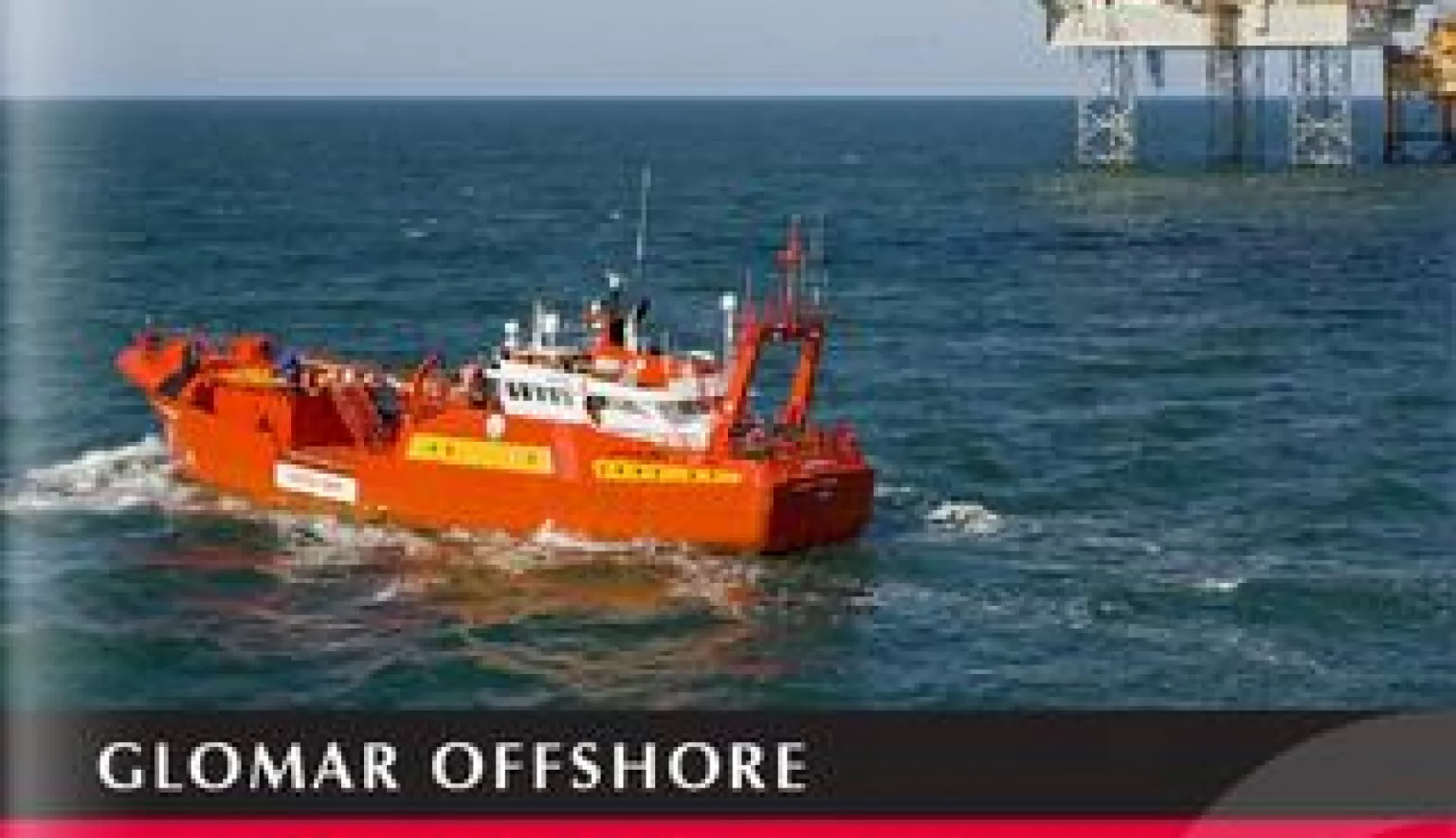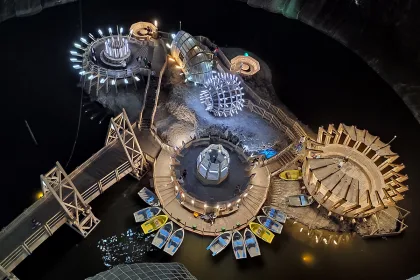The diversification and expansion of GloMar Offshore across the Dutch offshore support and safety industry has been extensive and rapid since its inception in 2007, but in a sector which is dependent on so many fluctuating trends, and with some of the world’s most renowned clients in tow, the Company is still embarking on some of its most significant investments to date.
DIVERSITY AT SEA
With operations across shipmanagement, subsea and inland diving, renewables and shipbuilding, the business’s goal of becoming a one-stop shop is largely reliant on the internal infrastructure that has been built over the past seven years, and continues to expand in 2015 and 2016 also; namely through the size of its vessel fleet.
Currently standing at 21, the continuous improvement strategy in recent years has been to add two vessels to the portfolio each year, but through a combination of opportunity and proactivity, GloMar has witnessed an additional eight ships entering its Polish shipyard in the past 14 months; a signal of intent as the business enters the next stage of its evolution.
“The additional eight vessels cater as hotel accommodation vessels, safety standby vessels and multi-role vessels and represented a big step up for the Company in terms of the kinds of certificates and accreditations we have adopted alongside the acquisitions,” explains GloMar’s Chief Commercial Officer, Mark van der Star. “Once the first step is taken, the second becomes easier, and we have put a lot of work, in the past year, into not just purchasing new vessels, but also then transforming each one for the kinds of work she will be carrying out.”
Following the striking of a pivotal new partnership, the four vessels acquired as a consequence – combining with the four additional purchases – make up the eight-strong influx and the excitement for GloMar now comes in applying its renowned branding to the ships before implementing them across a service range which far exceeds the initial expectations of the organisation.
GLOMAR EVOLUTION
Incepted as a brainchild of two entrepreneurs – one of which still remaining at the helm to this day – GloMar was initially set out to act as a guard vessel service to the oil & gas industry; a concept which received immediate recognition from some of the industry’s biggest players.
“Right from January, 2008, Gas de France (now ENGIE) asked us if we could provide NOGEPA safety standby services as well as the guard vessel duty, and the owner – given his background – was positive that we could convert our guard vessels into safety standby vessels,” recalls the Company’s Chief Operating Officer, Jan Wouter Thijssen. “From that point and signing our first long-term contract with Gas De France, the other oil majors like Total and Chevron soon followed, and we quickly grew from just a very small company of four people in 2008, to the size we are now, with 25 people and 21 vessels.”
Building a reputation for high quality and safety standards just as quickly, GloMar’s next evolutionary phase was to move into the renewables market through the building of a hotel accommodation vessel, and a subsequent inland diving division was later added to the ever-growing array of services.
“Then, in July, 2015, the Company decided to take the opportunity to truly invest in the subsea division of GloMar and not just keep it as an inland Company but also move towards offshore diving,” Thijssen continues. “With that, GloMar is not just a safety standby or renewables Company but also an offshore support vessel with capabilities across subsea diving, DSV and ROV.”
This entrepreneurial flair and conducive small size when it came to making quick market adjustments and additions to its portfolio has subsequently led to GloMar becoming a monopoly holder when it comes to safety standby services in the Dutch sector, especially; and the Group is now working tirelessly to ensure that each facet is continuously honed and improved in line with wider industry demands.
BEST-IN-CLASS
Working alongside oil majors from the very beginning demanded standards of the very highest quality from the offset, and GloMar has certainly not let said standards slip in the intervening years as it strives to not just meet market expectations, but to innovate and exceed them wherever possible.
Thijssen notes: “It’s always been our strength in not just adopting the highest industry standards but moving above and beyond them all the time. We can do that because we are small and flexible and it can be as simple as us being the first Company to implement wearing safety glasses on deck, or more substantial in adopting safety rules in the safety standby market.”
The same ethos is reflected in the Company’s quality and safety management systems also, having implemented ISO 9000, ISO 140001 and OHSAS 18001 standards into its safety remit in recent years. A rarity among the wider sector elite, accreditations such as these have subsequently laid down a marker for business partners, suppliers and clients as to GloMar’s positive intentions for future sustainability and differentiation in the industry.
“There are many things which do differentiate us from the rest, and while our best-in-class safety standards are certainly among them and are appreciated by all our clients, we also benefit largely from having our own shipyard and therefore by setting our own internal rates on vessels, which not many ship owners can match,” van der Star emphasises. “We can implement the latest technologies and build according to what the market needs before setting the rates, knowing comfortably that the competition is going to be more expensive.”
SAILING THE WORLD
Despite now being a mix of experienced and dominant in the safety standby industry, and then slightly more juvenile in the offshore domain, the overall philosophies remain the same, and the technical requirements applied to the overall fleet of vessels certainly overlap; making the ease of transition all the more comfortable and the trust among prospective new clients all the more likely to attain.
While some entering the lucrative offshore sector are having to do so via a large step up in technical expertise, GloMar’s experience in the wider ship management area makes the move more of a sidestep, making the new services easier to adopt, and making it easier for clients to understand the Company’s scope.
“With regards to trends in the industry, it’s always an uphill battle against the basis of quality, health & safety and the environment but we have made sure that we stay on top of that and have got ahead of ourselves through our accreditations,” Thijssen says. “While trends in the safety standby market don’t change a lot outside of general safety improvements, the subsea and renewables sector and the move towards subsea is something that a lot of companies are trying to move into, and we have been ahead of that for the past couple of years.
“We can now say that offshore support doesn’t just relate to safety standby but literally means support for everything that you can do offshore!”
The aim for GloMar now is to diversify the Company even further, becoming a one-stop shop in providing services across all subsea and renewable markets, but the opportunities certainly don’t end there, with a much more literal expansion also on the horizon.
Van der Star concludes: “For the past eight years we have worked in Europe and the Baltic area but there hasn’t been a lot of focus outside of that because of the oil markets collapsing and the amount of competition that has been in the renewables industry.
“In the future though, and as a result of our new partnership and additional vessels, we can go into the world alongside partners as far afield as New Zealand, Brazil, Myanmar, West Africa or the Americas; sailing the world’s oceans instead of two seas, and growing GloMar because of that.”




























